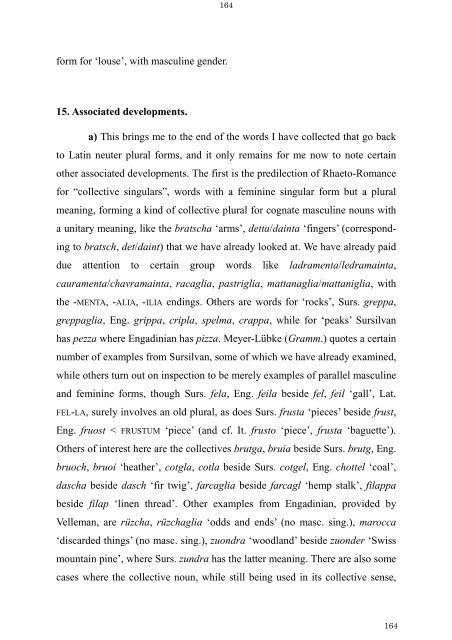The Latin Neuter Plurals in Romance - Page ON
The Latin Neuter Plurals in Romance - Page ON
The Latin Neuter Plurals in Romance - Page ON
You also want an ePaper? Increase the reach of your titles
YUMPU automatically turns print PDFs into web optimized ePapers that Google loves.
164<br />
form for ‘louse’, with mascul<strong>in</strong>e gender.<br />
15. Associated developments.<br />
a) This br<strong>in</strong>gs me to the end of the words I have collected that go back<br />
to <strong>Lat<strong>in</strong></strong> neuter plural forms, and it only rema<strong>in</strong>s for me now to note certa<strong>in</strong><br />
other associated developments. <strong>The</strong> first is the predilection of Rhaeto-<strong>Romance</strong><br />
for “collective s<strong>in</strong>gulars”, words with a fem<strong>in</strong><strong>in</strong>e s<strong>in</strong>gular form but a plural<br />
mean<strong>in</strong>g, form<strong>in</strong>g a k<strong>in</strong>d of collective plural for cognate mascul<strong>in</strong>e nouns with<br />
a unitary mean<strong>in</strong>g, like the bratscha ‘arms’, detta/da<strong>in</strong>ta ‘f<strong>in</strong>gers’ (correspond-<br />
<strong>in</strong>g to bratsch, det/da<strong>in</strong>t) that we have already looked at. We have already paid<br />
due attention to certa<strong>in</strong> group words like ladramenta/ledrama<strong>in</strong>ta,<br />
cauramenta/chavrama<strong>in</strong>ta, racaglia, pastriglia, mattanaglia/mattaniglia, with<br />
the -MENTA, -ALIA, -ILIA end<strong>in</strong>gs. Others are words for ‘rocks’, Surs. greppa,<br />
greppaglia, Eng. grippa, cripla, spelma, crappa, while for ‘peaks’ Sursilvan<br />
has pezza where Engad<strong>in</strong>ian has pizza. Meyer-Lübke (Gramm.) quotes a certa<strong>in</strong><br />
number of examples from Sursilvan, some of which we have already exam<strong>in</strong>ed,<br />
while others turn out on <strong>in</strong>spection to be merely examples of parallel mascul<strong>in</strong>e<br />
and fem<strong>in</strong><strong>in</strong>e forms, though Surs. fela, Eng. feila beside fel, feil ‘gall’, Lat.<br />
FEL-LA, surely <strong>in</strong>volves an old plural, as does Surs. frusta ‘pieces’ beside frust,<br />
Eng. fruost < FRUSTUM ‘piece’ (and cf. It. frusto ‘piece’, frusta ‘baguette’).<br />
Others of <strong>in</strong>terest here are the collectives brutga, bruia beside Surs. brutg, Eng.<br />
bruoch, bruoi ‘heather’, cotgla, cotla beside Surs. cotgel, Eng. chottel ‘coal’,<br />
dascha beside dasch ‘fir twig’, farcaglia beside farcagl ‘hemp stalk’, filappa<br />
beside filap ‘l<strong>in</strong>en thread’. Other examples from Engad<strong>in</strong>ian, provided by<br />
Velleman, are rüzcha, rüzchaglia ‘odds and ends’ (no masc. s<strong>in</strong>g.), marocca<br />
‘discarded th<strong>in</strong>gs’ (no masc. s<strong>in</strong>g.), zuondra ‘woodland’ beside zuonder ‘Swiss<br />
mounta<strong>in</strong> p<strong>in</strong>e’, where Surs. zundra has the latter mean<strong>in</strong>g. <strong>The</strong>re are also some<br />
cases where the collective noun, while still be<strong>in</strong>g used <strong>in</strong> its collective sense,<br />
164









